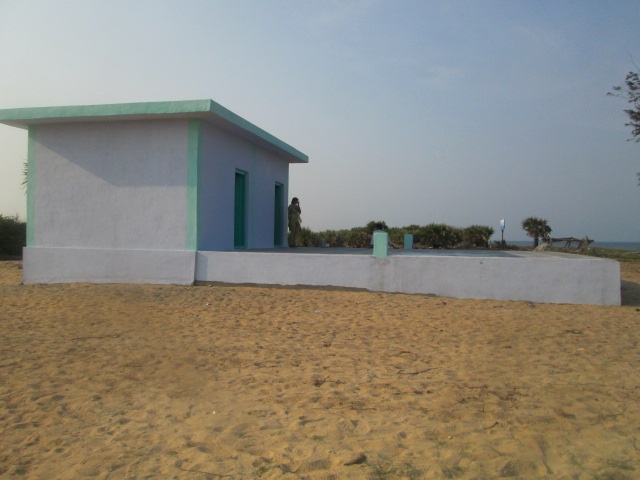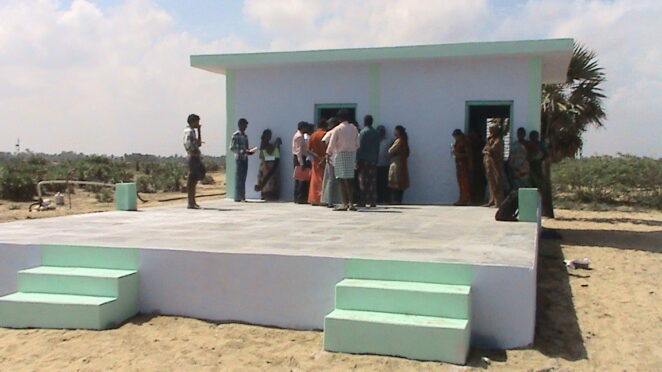Case-study /
Constructing a storm-proof fishing equipment storage facility – Securing and improving livelihoods of the fishing community of Srirampuram, India


Srirampuram and Ramudupalli Palem’s shed to protect fishing equipment
Srirampuram is a small village in Andhra Pradesh located 1.5 km from the sea of the Bay of Bengal. The 300 families rely on fishing as income source. According to locals, storms have been getting worse in the past years and occur even in the dry season. Extreme weather events have repeatedly damaged their fishing equipment as well as that of the neighbouring village of Ramudupalli Palem. In particular, the motors and gear left on the beach have been repeatedly destroyed by cyclones. Nets and boats were often washed out to sea during such extreme weather events.
Supported by the EU-financed AdaptCap project, the community constructed a shed near the fishing point close to the sea to protect motors and gears from storms and extreme weather events. The roof of the shed and the platform constructed in front of the shed are now used as a fish drying place. By protecting the fishing equipment, the livelihoods of the fisher families are safeguarded. This storm-proof shed is shared with the fisher people from the neighbouring community Ramudupalli Palem. In total, over 400 families benefit from this adaptation measure. The village of Srirampuram also profited from the nearby constructed causeway over the Buckingham Canal, an adaptation measure that was implemented by the neighbouring village Ramudupalli Palem. This sturdy bridge now ensures the communities’ mobility and has helped to improve the safety and productivity of the fisher folk. This adaptation measure resulted in:
- Protect fishing equipment to sustain livelihoods: The storage shed accommodates up to 5 fishing kits each worth Rs. 250,000, 10 motors each worth Rs. 30,000 and 30 medium size gears each worth Rs.15,000 at a time. The total value of the material protected is Rs. 20 million.
Implementation costs
The overall costs of this adaptation measure – including a local vulnerability and needs assessment, capacity building measures in the community, technical support as well as material and labour costs – amounted to Rs.634,650. Of these, Rs. 584,650 were borne by AdaptCap while the community contributed Rs. 50,000.
Operation & maintenance of the system
In order to remain operative in the long run, several parts of the system require regular operation and maintenance (O&M). Regular O&M activities include:
- Checking of slab and structure for cracks and attending repairs
- Regular maintenance of flooring and filling of loose joints
- Repairs to door, windows and ventilators
The community has distributed the responsibilities and time frames for O&M activities among their members. If possible, skilled community members provide O&M services against payment. The average monthly O&M costs amount to Rs. 1,500 and are fully covered by the community. The Village Development Committee collects the fee from the users of the storage shed on a yearly basis and uses it to undertake the necessary O&M works. The annual user fee per family is fixed at Rs. 100.This amount is reviewed once a year and if necessary revised based on the O&M needs.
M&E of activities and benefits
A monitoring and evaluation (M&E) system was developed to regularly screen and assess the adaptation project’s sustainability and impact. Information is collected in four areas:
- Effectively achieved vulnerability reduction
- Acceptance by and technical feasibility for the community
- Cost for implementation and regular O&M
- Positive and negative side effects (i.e., environmental, social, economic)
Challenges and lessons learnt
- Ensure a strong buy-in by the community and local authorities for the measure to achieve efficient and sustainable implementation.
- Community participation should be ensured throughout all phases of such an initiative. In Srirampuram the villagers were also given the possibility to contribute in constructing the shed towards their share for the pilot activity. A villager was selected to take care of the quality management during the construction process.
- Ensure construction works take place outside of the rainy season and design the time schedule accordingly as rains and cyclones may obstruct and even damage the ongoing works.
- Ensure water needed during the construction works is available in sufficient quantities in close proximity. For this adaptation measure, it was planned to take the water needed to construct the shed from a borehole near the construction area. But as the water was saline, water needed to be transported from the village to the construction spot.

Community using shed for storing fishing equipment
Project background and partners
The project “AdaptCap – Strengthening Adaptation Capacities and Minimizing Risks of Vulnerable Coastal Communities in India” financed by the European Commission has set out to strengthen the adaptation capacities of vulnerable coastal communities in Andhra Pradesh and Tamil Nadu (India) and minimize their climate change-related risks using an integrated approach.
The three-year initiative is implemented by the Indo-German Environment Partnership Programme of Deutsche Gesellschaft für Internationale Zusammenarbeit (GIZ-IGEP) in partnership with four Indian and international partners.
GIZ-IGEP is responsible for the overall implementation and project management.
Academy of Gandhian Studies (AGS) supports the stakeholders in three cities and nine villages in Andhra Pradesh as a local partner, providing training and implementation support in assessing adaptation needs and developing and carrying out adaptation measures.
AVVAI Village Welfare Society (AVVAI) fulfills the same role in Tamil Nadu.
adelphi contributed to developing technology solutions for the pilot projects and M&E frameworks, designing and implementing capacity building programmes and providing technical support for pilot project implementation.
ICLEI South Asia led the implementation of activities in the six urban areas targeted by AdaptCap.
